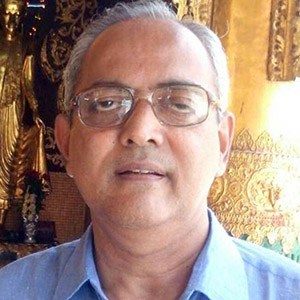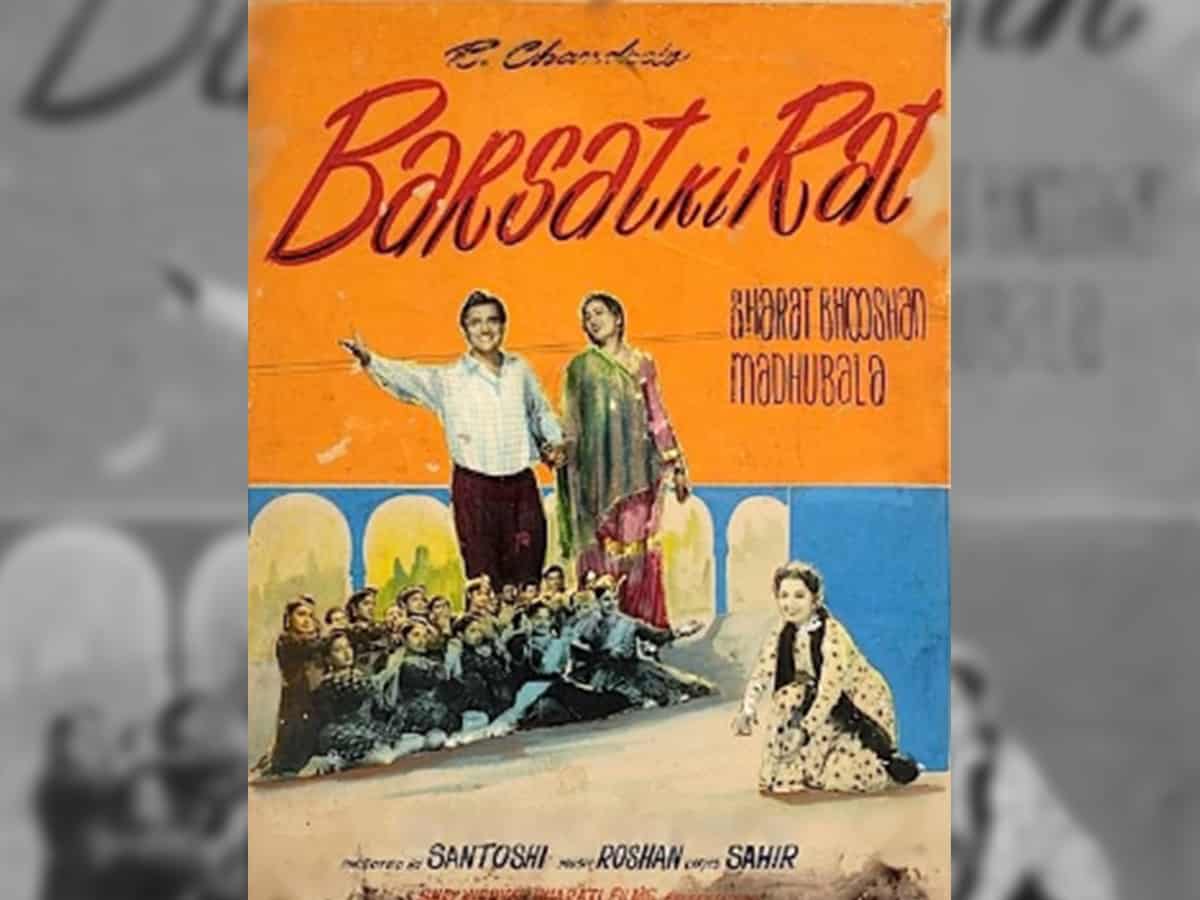
Madhubala starrer, Barsat Ki Raat, made 60 years ago in 1960, is an evergreen musical from the Golden Era of Indian Cinema. Six decades down the line in 2020, the film continues to cast an enduring magical spell on the audiences, like no other film ever has done.
In 1960, the all-time biggest grosser at the Box-Office was Mughal-e-Azam. At such a time, Barsaat Ki Raat went on to become the second-biggest super-hit film of that year. In a year of big releases, this was a big feat, as Barsat ki Raat was next only to Mughal-e-Azam, which was the biggest grosser of the times.
Barsat Ki Raat abounds in novelties, unthinkable in the films of those times. This film stands apart, as it breaks away from the past trends and has several novel features.
For instance, it features strong woman characters, who are all fiercely independent. All three leading women in the film choose their love and destiny.
Shabnam (Madhubala) defies parental intervention and elopes with her lover, poet Aman Hyderabadi. At a time when public singing for women was a taboo, Shama, played by Shyama, and her younger sister Shabab, played by Ratna (wife of Bharat Bhushan in real life), decide to take to singing Qawwalis as a profession. Shabab chooses to marry Qawwal Chand Khan, although he happens to be an adversary, later joins their father, Mubarak Ali.
Perhaps this is the first major, mainstream Hindi film that showcases Hyderabad as the Markaz of Urdu Adab, unlike other films, which mostly show Lucknow or Delhi as the seats of Urdu Culture. The erstwhile Hyderabad State, which comprised of 9 Telugu-speaking, five Marathi-speaking and three Kannad-speaking districts, was a great centre of Urdu Language and Culture. First Diwan of Urdu poetry is Quliyaat-e-Sultaan Mohammed Quli Qutub Shah and last of the great poets, Maqdoom Mohiuddin, both of Hyderabad.
Under Qutub Shahis and later Asaf Jahi’s, Hyderabad has been a centre of Urdu, which is more a celebrated cultural movement, than a mere language.
The erstwhile Hyderabad State was home to preeminent bards like Daagh Dehlvi, who came to Hyderabad as Tutor to Sixth Nizam, Mir Mehboob Ali Khan. Daagh Dehlvi mazaar is in Yousufain Dargah in Hyderabad.
Similarly, Josh Mallihabadi came to Hyderabad to head the Bureau of Translation in Osmania University, the only Urdu medium University in the times.
Barsaat Ki Raat features Mubarak Ali of Gulbarga, part of erstwhile Hyderabad State, and Chand Khan of Hyderabad, as the two rival Qawwals, who clash in Qawwali contests. Mubarak Ali of Gulbarga initially loses out, falling on bad times.
The film is a love-triangle, portrayed in the backdrop of intense Qawwali contests. Aman Hyderabadi (Bharat Bhushan) falls in love with Shabnam (Madhubala), daughter of Hyderabad Police Commissioner Khan Bahadur (K N Singh), whom he meets accidentally. Temporarily, Aman stays as a guest of Qawwali maestro Mubarak Ali of Gulbarga, who has fallen on bad times, as he loses the Qawwali contest and business. He seeks the help of Aman to regain his lost ground and fortune. That is when Mubarak Ali’s elder daughter Shama (Shyama) falls in love with Aman, only to lose him out in the end.
However, Aman goes to Hyderabad to work on the radio when he meets and falls in love with Shabnam (Madhubala). When they elope and temporarily move to Lucknow, he changes his name to Kamaal Lucknowi. Still, since he is a singer, his voice gives him away and Hyderabad Police Inspector (played by Chandrashekhar, who also belongs to Hyderabad), lands up to take Shabnam back to Hyderabad.
In the finale of the Qawwali contest in Ajmer, Mubarak Ali regains his upper-hand. This becomes possible, as the long-time rival Chand Khan joins him and Aman Hyderabadi arrives in time to assist Mubarak Ali to win back his lost glory.
Against the backdrop of three evocative Qawwali competitions, the travails of the love triangle of Bharat Bhushan, Madhubala and Shyama are depicted; in the end, Bharat Bhushan and Madhubala are united.
It was among the last few films of Madhubala, Venus of the Indian Silver Screen, who chose to fade away into oblivion, as her health condition deteriorated and she passed away on February 23, 1969. Shyama, born as Khursheed Akhtar in Lahore in 1935, who rose to be a leading star in Indian Cinema in the 1950s, plays a stellar role in the film, where she leaves an impact.
The film has yet another facet. Like Naushad and Shakeel Badayuni made a famous musician-lyricist team, another revolutionary team-up was that of Music Director Roshan and Lyricist Sahir Ludhianvi.
Shakeel Badayuni was the uncrowned king of romantic poetry, while Sahir Ludhianvi was considered a progressive and revolutionary poet. But, in Barsat ki Raat, Sahir proves to be a perfect foil for Shakeel in coming up with romantic poetry.
Sahir comes up with stirring romantic poetry, especially in the title-song sequence, which is his first song of the protagonist Aman for the radio.
As Aman roams around, seeking inspiration for his first song for the radio, rain, lightning and thunderstorm strike. He takes shelter in a blacksmith’s verandah, when Shabnam also comes there, as her car fails on the way.
Catching her glimpse in the lightning and the chance encounter provide the perfect setting for penning his maiden song for the radio.
Zindgi bhar nahi bhoolegi woh barsaat ki raat, ek anjaan haseena se mulaqaat ki raat. What is unique about the song ls that it goes on to narrate the encounter with her. Dar ke bijali se, achaanak woh lipatana us ka, Aur phir sharm se balkhaake simatana us ka, Kabhi dekhi, na suni aisi tilismaat ki raat.
Then comes the graphic detail. Surkh aanchal ko daba kar jo nichoda us ne, Dil pe jalta hua ek teer sa chhoda us ne, Aag paani mein lagaate huve haalaat ki raat. Hearing the song on the radio that lists the sequences of their encounter, she realizes that the person she accidentally met the previous night was none other than her favourite poet, Aman Hyderabadi.
Similarly, there are 2 other solos of Mohammad Rafi, Main ne shaayad tumhe, pehle bhi kahin dekha hai and Mayoos toh hun vaade se tere, which are captivating. Similarly, there is a beautiful song picturised on Shyama, Mujhe mil gaya bahaana tere deed ka, kai si khushi leke aayaa Chaand Eid Ka.
There are fierce Qawwali competitions, like Nighaen-e-naaz ke maaron ka haal kya hoga and Pehchaanta hun khoob tumhari nazar ko main.
The finale is in Ajmer Sharif, Na toh caravan ki talaash hai, na toh humsafar ki talaash hai, where Sahir shines as the greatest romanticist, bringing out shades of the Temporal and the Spiritual. Ishq aazaad hai, Hindu na Musalmaan hai ishq, Aap hi Dharm hai aur aap hi Imaan hai ishq, Jis se aage na Sheikh-o-Brahaman donon, Us haqeeqat ka garajtaa hua ailaan hai ishq.
As Aman springs to the aid of Shama, Shabnam, already in Ajmer Sharif, hears his voice on the radio and rushes to the venue, where the ultimate reunion takes place.
Drawing upon the Composite Indian Culture, Sahir lines here are replete with the rich Radha-Krishna imagery. Jab jab Krishna ki Bansi baaji, nikli Radha saj ke, Jaan ajaan ka dhyaan bhulaake, lok-laaj ko tajke, Haaye ban-ban doli Janak-Dulari, pahan ke prem ki mala, Darshan jal ki pyaasi Meera, pee gayi bis ka pyala, Aur phir arz kari ke laaj raakho dekho-dekho.
The ultimate in lyrical poetry, allusions and transcendent symbolism is yet to follow: Allah, Rasool ka farmaan ishq hai, Yaani Hadith ishq hai, Quraan ishq hai, Gautam ka, aur Maseehaa ka, armaan ishq hai, Yeh kaayanaat jism hai aur jaan ishq. hai, Ishq sarmad, ishq hi mansoor hai, Ishq Moosa, ishq Koh-e-Toor hai, Khaaq ko but, aur but ko Devtaa karta hai ishq, Intahaa yeh hai ke bande ko khuda karta hai ishq.
Barsat ki Raat stands apart as the greatest-ever musical of all times of the Indian Cinema.

